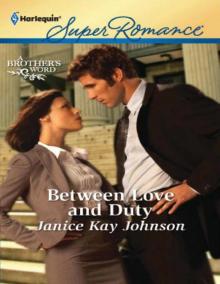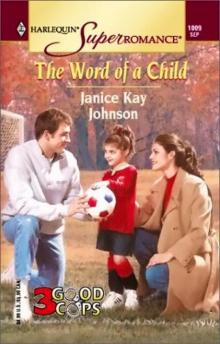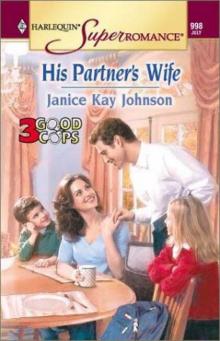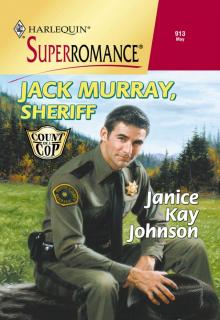- Home
- Janice Kay Johnson
Jack Murray, Sheriff Page 4
Jack Murray, Sheriff Read online
Page 4
When she raised her head again, she had regained control. Almost steadily, she asked, “What do you mean, over me?”
Murray surprised her by covering her clenched fist with his large hand. “It would appear that Mr. Sommers was insulting you. The other man took exception to what he was saying. They’d both had a few too many.”
“Is he…is he in jail?”
“He was held overnight. My guess is he’ll plea-bargain and end up with no more than probation and a promise to attend AA or go into alcohol treatment.”
“I wouldn’t have said he had a drinking problem.” Beth sighed. “But then, he’s doing a lot of things I never thought he would.”
“Does he drink when the girls are with him?”
“Oh, God.” She’d never asked. Wouldn’t Steph, at least, have said? “I don’t know. In the past when he was mad, like the night you saw him, he didn’t seem drunk.”
“No, he didn’t,” Murray conceded.
Neither said anything. The silence began to feel awkward. Beth looked at her half-eaten lunch and decided she wasn’t hungry. The sheriff hadn’t even picked up his fork to start the pie the waitress had brought.
“Ms. Sommers…” He growled something under his breath and rubbed the back of his neck as though the muscles were stiff. “This is probably unprofessional of me…. No, it’s damned unprofessional, but I’m going to do it anyway. Will you have dinner with me?”
“Dinner?” She felt like an idiot echoing him, especially since on some level she, too, had felt the attraction. But she had assumed him to be married, or that he would be put off by her problems, or…
He looked uncomfortable. “I’d like to take you to dinner,” he said again.
Beth was shaking her head even before she had thought any further. “Sheriff…”
“Jack.”
The title had helped her think of him as a police officer, a public official, not as a man. She needed the safer distance that gave her. But she could hardly refuse to use his first name.
“Jack, then,” Beth agreed. “I’m sorry, but…”
“Why not?” he asked bluntly, his dark gaze square on her face.
He was big enough that she felt crowded suddenly in the booth. His knees bumped hers as he moved restlessly; his shoulders blocked her view of the front of the café. Beth imagined wrapping her arms around his neck, ruffling his silky hair, feeling that hard, crooked mouth on hers, and gave a shiver of near panic.
“Surely you can see this isn’t a good moment for me to be thinking about getting involved….”
“Don’t let him stop you.”
“I…” She blinked. Did she fear that she would anger Ray more? But she knew even without deep analysis that her reasons were more complex.
“If I’d let him stop me from doing what was right for me, we’d still be married. This is just…not the best moment.” She didn’t add that he wasn’t the man with whom she would have chosen to start, either. “I’m flattered that you’re interested, but you’ll have to accept my regrets. Now, I really should be getting back to the store.”
Hands flat on the table, he had gone very still. “If you change your mind…”
She made a face at him. “I’ll call the Butte County Sheriff’s Office and pass on a message. Right.”
His mouth crooked into a faint smile. “That wouldn’t be a problem.”
Despite herself, she hesitated. “Thank you,” she said, and meant it.
Murray cleared his throat. “Ms. Sommers…Beth. I, uh, hope I haven’t made you uncomfortable. I want you to be able to call if you need me. I live close by.” He reached inside his suit coat and took out a business card, extending it across the table to her. “My home phone. I can be at your place in not much over a minute.”
Her sinuses burned and she gripped the card so tightly it crumpled in her fingers. “I don’t know what to say.”
He picked up his fork. “Don’t say anything. Just don’t hesitate if you need me.”
For an instant their eyes met, and her pulse took an odd leap. Then she pressed her lips together, gave a jerky nod and slipped out of the booth. One more “Thank you,” and she fled, pausing only long enough to pay the cashier.
She could feel his gaze on her back as she waited for her receipt and hurried out the front door. Why she was compelled to hurry, Beth couldn’t have said. Her heart was beating too hard; exhilaration was mixed with a need to run. She tried to convince herself that the news about Ray was the cause of her turmoil, but failed.
Not that it wasn’t upsetting. During the final months of their marriage, Ray had scared her by the depth of his temper; several times he had viciously flung a chair or lamp across the room, breaking it, and during that last, memorable fight, he’d slammed his fist through the wallboard. But even then, he hadn’t hurt her.
Had that changed? If Ray could break a man’s nose in a tavern brawl, what might he do to her?
He had been drunk, she reminded herself, but Beth recognized the excuse for what it was. Anyway, there was no saying he wouldn’t come to her house drunk some night.
The locksmith had already replaced the locks and added a few on windows and the French doors leading out to the deck in back. But she hadn’t done anything about buying a security system. It seemed so ridiculous in Elk Springs, for heaven’s sake!
But now she imagined Ray, drunk, pounding on the door, his fury rising because she wouldn’t let him in. The locks on the French doors wouldn’t stop him from breaking a pane of glass and opening the door.
She would definitely call around this afternoon and get some bids.
Beth’s pace slowed as she reached the main street and turned the corner. Face it, she told herself, stopping to look in the bakery window without seeing the temptations arrayed there. It wasn’t just the news about Ray that had upset her. It was Jack Murray. Why did he have to be interested in her?
And why now?
She wasn’t ready. In that part of her mind reserved for vague thoughts about the future, she had imagined another man, someday. He would be nothing like Ray, nothing. He was some sort of compendium of the modern men found in television commercials. She had seen him clapping at school plays, stir-frying dinner in the wok. He was a reader, a man who would think nothing of running over to Portland for a major museum exhibit, who never raised his voice, who listened intelligently, asked for her thoughts. He was faceless, this man, almost sexless, pleasant, thoughtful, even-tempered…unreal. A bloodless fantasy for a woman who had had too much of strong emotions, who didn’t want gritty and real, who’d had enough of that.
Jack Murray was real. She could imagine him strolling the hushed galleries of the museum, but when she closed her eyes, she saw him playing one-on-one basketball at the gym, sweating, grunting, using his elbows, slamming against another man as they went up for a rebound. He had been soft-spoken with Ray and her, but he also patronized women, undoubtedly raised his voice, and probably got some kind of charge out of wearing a gun.
And he tweaked something sexual in her that hadn’t been touched in a long time, and certainly not by the faceless man she tried so hard to see when she lay alone in bed at night.
Beth let out a long breath of air, blinked and realized that through the glass she was staring right at Mrs. Parker behind the counter in the bakery. The woman was smiling uncertainly, and Beth managed to pull herself together enough to return the smile.
Damn it, she thought a minute later, pushing open the door of Sisters Office Supply, a woman could make intelligent choices. Ray was all she’d ever known. The sexual part of her had been tuned to him; it was natural that she responded to the promise of brawn and dominance.
But she could change that, and would. Jack Murray’s capacity for violence might be harnessed on the side of angels, but it was there, as much a part of him as it was of Ray. She’d spent enough years tiptoeing around to avoid rousing the beast that was anger and violence. Somewhere she’d found the strength to wake him and not quail,
to lock him out of her house.
She would not invite him in again, not in any guise.
CHAPTER THREE
“I WISH I COULD GIVE you better news,” Beth’s lawyer said, shaking his head. “We could go back to court and contest your ex-husband’s visitation rights, but frankly, I don’t think we’d win there unless you can bring proof that he’s done more than be late a few times bringing the girls back.” Mr. Knightley held up one hand to forestall her protest. “I’m not telling you what I think, I’m telling you what the judge will think. I have no doubt whatsoever that Mr. Sommers is at least trying to scare you. But we need proof.”
Beth let out a long breath. “Thank you, Mr. Knightley. I really didn’t expect anything else. But I hoped.”
The attorney was perhaps fifty, a handsome man who had gained more presence and authority with the addition of an extra thirty or so pounds that might have looked like fat on another man. He had done some legal work for her business, so she had turned to him when she decided to file for divorce.
“How do the girls feel about their father?” he asked, rolling a rosewood pen between his palms.
“I’m not sure,” Beth admitted. “The divorce upset them, of course, but also…” She hesitated. “I think they were relieved. There was a lot of yelling going on. And yet, until recently they seemed happy to see their dad and looked forward to their visits. It’s harder for Stephanie, because even though she only sees Ray every other week, she feels like she’s missing out on things her friends are doing. But lately…” She sought for words to define her amorphous awareness of their uneasiness. “I know they’ve both been, maybe not scared, but uncomfortable when he’s kept them so late. But I can’t in all honesty say he’s a terrible father or they’re frightened of him. That’s why I’ve hesitated about doing anything too drastic. I think it’s important for them to have a relationship with their own father.”
The lawyer nodded and set the pen back in its stand. “I wish I knew better how to advise you. Have you considered talking to a counselor? You might find somebody who’s an expert on anger management, who could at least give suggestions on the best way to defuse any situations.”
“That’s an idea,” Beth agreed, picking up her purse. “I won’t take any more of your time, Mr. Knightley. I appreciate the information you’ve given me.”
He stood, too. “If the police catch him red-handed pulling one of these malicious tricks, we might have the ammunition to go back to court. I think that would qualify as compelling evidence showing that Mr. Sommers is an unfit parent.”
And then what? Beth thought bleakly. How would the kids come to terms with a label like that put on their father? He was half of them; she had no desire to make them despise that part of themselves.
But what else could she do?
Nobody had any other suggestions, that was for sure. All she heard was “Call the police.” Wasn’t that supposed to be a last resort?
Well, one thing she could do, Beth thought, was talk to Stephanie and Lauren. It didn’t seem to her that a father could succeed in disappearing with a child as old as Stephanie without some cooperation from the child. On some level Stephanie especially would have to be willing to believe that her mother didn’t care, didn’t mind losing her, or would be hurt in some way if she called home. Beth’s job was to make sure her girls were unwilling to cooperate if Ray tried to take off with them.
So that evening she sat them down on the couch in the family room at the back of the house.
This was the time of day she had always—and still did—read bedtime stories to Lauren, who didn’t yet want to give them up although she could read herself. Stephanie, who claimed to be too old to listen, usually sat in the overstuffed armchair and pretended to read herself while eavesdropping avidly. Every few pages she’d ask to see the picture, and Beth would obligingly hold it up. “Why don’t you come and sit with us?” she’d ask, and Steph would curl her lip. “Little kids’ books are boring. I only wanted to see the one picture, that’s all.”
But tonight Beth patted the sofa next to her. “Come here. I want to talk.”
Her older daughter hovered in the doorway. “The phone’s ringing. I’ll go get it.”
“Just ignore it. Half the time nobody’s there anyway.” Beth had abandoned the fiction of wrong numbers. The girls had answered the phone themselves and found nobody on the other end too many times now. The doorbell hadn’t rung since that second night; the phone had, off and on. It hadn’t ceased to unnerve Beth, but the repetition had begun to make her impatient instead of terrified.
“But it might be one of my friends.” Steph was verging on a whine.
“Then she can call back,” Beth told her firmly.
Eleven years old, and Steph already had a sneer down pat. She sat reluctantly where Beth had indicated. Lauren curled trustingly against Beth’s left side.
She took a deep breath and began her prepared speech. “I just thought it was time we have one of those talks about safety.”
She’d expected rolled eyes, but instead Stephanie sat stiffly, looking down at her hands but not saying anything.
“Mostly we parents talk, just in case, about stuff that will probably never happen. This is one of those just-in-cases. I hope nothing bad or scary ever happens to you, but you should know what to do if it does.
“Once in a while, somebody steals a child. It isn’t always a stranger, either. Sometimes it’s somebody the child knows, like a neighbor. Sometimes it’s even a parent. Mostly with parents it’s when a mother and father are divorced and they’re fighting about who the kids will live with. You know your dad and I have already settled that. But I just wanted you to know that it isn’t always a stranger. It might be somebody you trust.”
Lauren’s blue eyes were wide and dark; Stephanie still had her head bowed. Beth could feel her tension as though it were a violin string quivering from the lightest touch.
“Now, if you took a child, not to hurt her, but because you want to pretend you’re her mother or father and she doesn’t have anybody else, you couldn’t keep her locked in the bedroom forever, right? So what you’d do is try to convince the child that she was supposed to be with you, that whoever she was living with really didn’t want her anymore.”
Tiny creases formed on Lauren’s smooth brow. “I would never, ever, believe anybody who said you didn’t want me,” she informed her mother staunchly. “’Cause I know you love us.”
Momentarily Beth’s eyes stung, and she had to blink hard as she bent to kiss the silky top of her younger daughter’s hair. Then she reached out and gathered Stephanie’s stiffer body into a hug.
“I just want to make sure you know that. That you don’t believe anybody at all who tells you different. If something like that ever happened, you should get away as soon as you can. You can call home—you know the number—or you could go to the police or most adults, like a grocery checker or a librarian. You tell them over and over again where you live and what your phone number is. Will you promise me to do that?”
Lauren nodded dutifully, her eyes still saucer wide. On Beth’s other side, Stephanie mumbled agreement.
“Then that’s all I have to say. I love you two more than anyone or anything in the whole world. And I always will.”
Lauren nodded, as though to say “Of course.” “Can we read some stories now?”
“You go pick something out,” Beth said, kissing her forehead before she released her.
The eight-year-old skipped out of the room on her way toward the bedroom bookcase. Once she was out of sight, Stephanie said, “This is about Dad, isn’t it?”
Treading delicately, Beth said, “Not altogether. I really don’t think your father would do something like that. This is the kind of thing we should talk about no matter what. But, yeah, it was his being late with you that brought it to mind. After I’d gotten over being scared that you’d been in a car accident.”
Her attempt to reassure apparently worked, because Ste
phanie gave her a look. “Oh, Mom.”
Beth was able to laugh. “I know, I know. I’m a worrywart. But I can’t help it, okay? Humor me.”
Stephanie nodded. There was a moment of silence, and Beth waited, sensing that she had something else to say. Suddenly Stephanie burst out, “I don’t want to live with Dad!”
A chill wrapped itself around Beth’s chest. “Did he ask you if you wanted to?”
“No…” She bit her lip. “Sometimes he says stuff…but mostly he talks about us all together, like he thinks you’re going to change your mind. Are you?”
“No. Do you wish I would?”
Stephanie ducked her head. “Not really. I mean, sometimes I wish we were like other families, and I didn’t have to go visit my dad, but… I didn’t like it back when he lived here and he always got so mad.”
“Me, either.”
“He gets so mad about even little stuff.”
That same chill held Beth in its grip. “At you?”
“No-o,” her daughter said uncertainly. “We never do anything to make him mad. Except when I ask him if it’s time to go home. But it’s just—” she shrugged and made a face “—everything. He yells at the TV when he thinks some referee made a dumb call, and he yells and flips off other drivers, and I was afraid he was going to punch some guy at the gas station one time because Dad thought the guy cut in front of him. It’s just…” She squirmed. “It’s scary. You know what I mean?”
“Yeah,” Beth said softly. “I know what you mean.” She bit her lower lip. “I hate to send you on your own to deal with him. But I think under all that anger he’s not a bad man. And he’s your father. If you grew up not knowing him, I bet someday you’d be sorry. I keep hoping that he’ll realize how he’s making other people feel and do something about it. But if he really, really scares you—”
“No, it’s okay,” Stephanie interrupted, looking older than her years.
Beth looked her straight in the eyes. “Will you promise to tell me if it’s ever not okay?”

 Home Deadly Home
Home Deadly Home From Father to Son
From Father to Son All the Lost Little Horses (A Desperation Creek Novel Book 2)
All the Lost Little Horses (A Desperation Creek Novel Book 2) Hide the Child
Hide the Child Within Range
Within Range Between Love and Duty
Between Love and Duty First Comes Baby
First Comes Baby Charlotte's Homecoming
Charlotte's Homecoming In A Heartbeat (HQR Superromance)
In A Heartbeat (HQR Superromance) The Call of Bravery
The Call of Bravery In Hope's Shadow
In Hope's Shadow Anything for Her
Anything for Her Harlequin Superromance September 2014 - Bundle 1 of 2: This Good ManPromises Under the Peach TreeHusband by Choice
Harlequin Superromance September 2014 - Bundle 1 of 2: This Good ManPromises Under the Peach TreeHusband by Choice The Baby Agenda
The Baby Agenda More Than Neighbors
More Than Neighbors Her Amish Protectors
Her Amish Protectors All That Remains
All That Remains Whisper of Revenge (A Cape Trouble Novel Book 4)
Whisper of Revenge (A Cape Trouble Novel Book 4) In a Heartbeat
In a Heartbeat A Mother's Claim
A Mother's Claim Because of a Girl
Because of a Girl Back Against the Wall
Back Against the Wall Dangerous Waters
Dangerous Waters Mommy Said Goodbye
Mommy Said Goodbye A Mother's Secret
A Mother's Secret See How She Runs (A Cape Trouble Novel Book 2)
See How She Runs (A Cape Trouble Novel Book 2) Plain Refuge
Plain Refuge Bringing Maddie Home
Bringing Maddie Home For the Girls' Sake
For the Girls' Sake Through the Sheriff's Eyes
Through the Sheriff's Eyes Yesterday's Gone (Two Daughters Book 1)
Yesterday's Gone (Two Daughters Book 1) All a Man Is
All a Man Is Harlequin Superromance January 2014 - Bundle 1 of 2: Everywhere She GoesA Promise for the BabyThat Summer at the Shore
Harlequin Superromance January 2014 - Bundle 1 of 2: Everywhere She GoesA Promise for the BabyThat Summer at the Shore No Matter What
No Matter What Wakefield College 01 - Where It May Lead
Wakefield College 01 - Where It May Lead Someone Like Her
Someone Like Her THE WORD OF A CHILD
THE WORD OF A CHILD Harlequin Superromance May 2016 Box Set
Harlequin Superromance May 2016 Box Set Open Secret
Open Secret The New Man
The New Man Finding Her Dad
Finding Her Dad The Perfect Mom
The Perfect Mom All Through The House
All Through The House Match Made in Court
Match Made in Court Making Her Way Home
Making Her Way Home From This Day On
From This Day On To Love a Cop
To Love a Cop The Hero's Redemption
The Hero's Redemption HIS PARTNER'S WIFE
HIS PARTNER'S WIFE Jack Murray, Sheriff
Jack Murray, Sheriff Dead Wrong
Dead Wrong Twisted Threads (A Cape Trouble Novel Book 3)
Twisted Threads (A Cape Trouble Novel Book 3) Bone Deep
Bone Deep The Closer He Gets
The Closer He Gets With Child
With Child Whose Baby?
Whose Baby? Kids by Christmas
Kids by Christmas